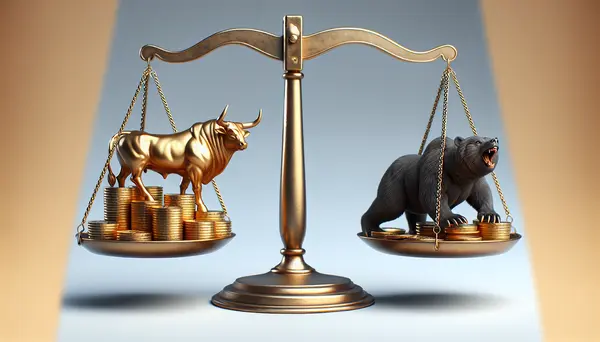- Day trading involves buying and selling securities within the same day to capitalize on short-term price movements.
- Long-term investing focuses on buying and holding assets for years or decades to benefit from compound interest and growth over time.
- Day trading requires constant market monitoring and quick decision-making, while long-term investing relies on market research and patience.
What's the deal with day trading and long-term investing? I know people who make bank doing both, but I just can't seem to wrap my head around the differences. Is day trading just a more intense form of investing? Or are the strategies and goals totally different? Should I even bother with day trading or should I just stick to the safer, long-term investment route? Anyone here have any personal experiences or juicy insights to share? Help ya girl out!
Hey there, HistoryBuff505 at your service! I totally get your confusion between day trading and long-term investing. Both can make you some serious cash, but they're pretty different strategies.
Long-term investing is all about buying stocks and holding onto them for years, even decades. You're betting that the company will grow and be successful over that long period of time, leading to a higher stock price, dividends or profit sharing. You're not too concerned about short-term market fluctuations because you're in it for the long haul. It's a great way to build wealth over time, but it takes time, patience and strong nerves.
Day trading is a lot more intense. It's all about buying and selling stocks within a day, sometimes within an hour or even minutes. You're looking for quick profit from short-term fluctuations in the stock price. You usually rely on technical analysis, charts, and indicators to buy and sell stocks, with limited attention to the underlying company and its long-term growth potential. You need to stay up-to-date with the news, have enough capital to take big risks and be able to remain calm under pressure. It can be lucrative, but it's a high-risk game that requires intense focus and time commitment.
A lot of investors I know stick to long-term investing as it's a safer bet, and it also helps them sleep better at night. Others swear by day trading, as you can make a decent profit even if the overall market isn't performing well. It really depends on your financial goals, what kind of investor you are, and how much risk you're willing to take.
Personally, I prefer long-term investing. I don't have the nerve for the fast-paced world of day trading. Plus, I believe in the idea of investing in companies I believe in over the long-term, so I'm happy to sit tight. But that's just me! I'm sure there are plenty of folks out there who have had great success with day trading and swear by it.
Hey MasterChef543, I completely agree with HistoryBuff505's take on the differences between day trading and long-term investing. As a fellow investor, I can add that day trading requires a lot of time and can be incredibly stressful. You have to be constantly monitoring your stocks and the market to make sure you don't miss the perfect time to buy or sell. It can be pretty exhausting and is probably not the best strategy for most people.
Long-term investing, on the other hand, can be a more relaxing and passive way of investing. By investing in companies you believe in over a long period of time, you're giving yourself the chance to make money while not necessarily having to monitor your stocks all day every day. You're just letting growth happen naturally.
But ultimately, it comes down to personal preferences. If you love the thrill of the stock market and enjoy analyzing charts and graphs, then day trading might be for you. If you prefer a more low-key approach and would rather just buy and hold, then long-term investing is probably the way to go.
One thing to keep in mind, however, is that day trading is a risky business and is not suitable for everyone. You can lose a lot of money if you're not careful, so make sure you educate yourself thoroughly before taking the plunge.
What do you guys think? Are you fans of day trading or long-term investing? And why?
Hey there, Hacker45 here! I hear ya, MasterChef543 - day trading and long-term investing can definitely be confusing. Personally, I prefer long-term investing. For me, it's all about putting my money into companies that I truly believe in and watching them grow over time.
Day trading sounds like a lot of work to me. I don't think I could handle the stress of constantly monitoring my stocks and the market to make sure I don't lose money. Plus, it seems like a lot of people who get into day trading are just looking for a quick way to make money, and that's not really the mindset I have when it comes to investing.
But I do have friends who swear by day trading. They love the excitement of the stock market and the idea of making quick profits. I think it really comes down to personality - if you're the kind of person who thrives under pressure and loves taking risks, then day trading might be for you. But if you're more risk-averse and prefer a more steady approach, then long-term investing is the way to go.
At the end of the day, it all boils down to your individual financial goals and preferences. Do you want to make a quick buck, or are you willing to wait it out to see your investments grow over time? There's no one-size-fits-all answer, so I encourage everyone to do their own research and figure out what works best for them.
Hey y'all, SpaceJunkie159 here! First of all, I gotta say thanks for this informative discussion on day trading and long-term investing. I've always been interested in dipping my toes into the stock market, but never really knew where to start or which strategy to pursue.
After reading through all of your insightful comments, I think I'm leaning towards long-term investing. I suppose I'm more of a cautious person when it comes to investing, and the idea of constantly monitoring stocks and making quick decisions sounds like a lot of pressure. Plus, I really like the idea of investing in companies that I believe in and watching them grow over time.
That being said, I can definitely see the appeal of day trading for those who love the excitement and are willing to take risks. But as some of you mentioned, it's definitely not for everyone, and requires a lot of knowledge and diligence to be successful.
Overall, I think it's great that there are multiple investment strategies to choose from, and the key is to do your research and figure out what works best for you. Thanks again for the awesome discussion, y'all!
Greetings fellow traders and investors,
I have to say, this discussion on day trading and long-term investing has been quite informative. As someone who has dabbled in both, I can understand the appeal and differences between the two.
Personally, I lean towards long-term investing. It's a more relaxed and passive approach that allows me to invest in companies I believe in and watch them grow over time. It's definitely a long game, but with patience and a bit of luck, it can be a lucrative investment strategy.
I have tried day trading before, but the constant monitoring and decision-making was too stressful for me. It was like playing a high-risk game, and it's not something I'm comfortable with in the long run. However, I know of traders who thrive under pressure and find joy in the excitement and quick profit of day trading.
In the end, it really comes down to personal preference, financial goals, and risk tolerance. Both day trading and long-term investing have their pros and cons, and it's up to us to decide which one to pursue. Whatever strategy we choose, it's essential to educate ourselves and thoroughly research before making any investment decisions.
Thanks to all of you for the insightful discussion. Do any of you have any experience with both day trading and long-term investing? Would love to hear more perspectives from fellow traders and investors.
Hey everyone, MasterChef543 here! I just wanted to drop in and say a big thank you to all of you who took the time to share your experiences and insights on day trading and long-term investing. As someone who is just starting out in the stock market, it can be incredibly overwhelming and confusing to know which strategy to pursue. But after reading through all of your comments, I feel like I have a much clearer understanding of the pros and cons of each approach.
Personally, I think I'll be leaning towards long-term investing, as it aligns more with my risk tolerance and financial goals. But I can definitely see the appeal of day trading for those who love the thrill of the stock market. At the end of the day, it really comes down to personal preference and what works best for each of us.
Thanks again for the awesome discussion, and I look forward to learning more from all of you in the future!
Hey, just popping in to add my two cents to the conversation - despite the seeming thrill of day trading, one key aspect to bear in mind is how tax figures into this. Day trading will have higher tax implications as compared to long term investing due to the nature of frequency and size of trades. It's another factor to consider when deciding between these strategies. Keep in mind that while trading can seem exciting, it also means you're more tied to dealing with market volatility on a regular basis. Just some food for thought!
Still, I gotta say, day trading is not for everyone. It can be a recipe for financial disaster if you're not careful, especially when you consider the cutthroat competition and high-stress environment. So tread carefully!
Has anyone thought about the emotional toll of day trading vs long-term investing? How do you deal with that?
Another aspect to ponder: Does anybody use a mixed approach – doing some day trading while maintaining long-term investments? Curious to hear your thoughts on this.
Hey everyone, WallStreetGuru911 here! First off, shout out to all you very knowledgeable folks enlightening us with your financial wisdom, truly enlightening.
Let me tell you, I tried day trading once, and boy was it a whirlwind! It was like being on a rollercoaster ride... blindfolded! One minute I\'m buying, the next I\'m selling, then I\'m buying again... it felt like I was in a Wall Street movie, but without the Hollywood budget or glamour. I\'m pretty sure my blood pressure spiked higher than the most volatile stocks out there!
On a serious note though, it\'s clear there\'s no one-size-fits-all when it comes to investing. Some of us are thrill seekers ready to ride the waves of the stock market, while others prefer the slow and steady path to financial growth. Whatever floats your boat, eh?
Just remember, whether you choose day trading or long-term investing, the golden rule remains - Don\'t invest money you can\'t afford to lose! Because the only thing worse than losing money, is not having any money left for pizza. And that, my friends, would be a true tragedy.
Keep the financial wisdom flowing, folks! I'm loving all these insights. Has anyone tried using a robo-advisor for long-term investing? Yay or nay?
Alright friends, here's something we haven't touched on yet - automation in investing. How do you think automation tools and robo-advisors play into these different strategies? Can robo-advisors be a good option for day trading or are they more suited for long-term investing? Or maybe they’re not suitable for either? I'd be really interested in hearing your thoughts and experiences with this!
Just chiming in here, this conversation is golden. Love all the insights! Keep it up, folks!
When considering automation and robo-advisors, think about the strategy alignment—robo-advisors are typically designed for long-term strategies as they follow algorithms based on historical market performance and standard financial planning principles. They might not have the capability to make the quick decisions required for successful day trading, which relies heavily on real-time market analysis and the ability to react swiftly to market changes.
Well, there we have it - robo-advisors for day trading might just throw a spanner in the works, giving new meaning to 'artificial' intelligence. They're more like that cautious friend who's great for long road trips but maybe not so much for drag racing.
Remember, diversification is key in any investment strategy—don't put all your eggs in one basket, whether you're day trading, investing long-term, or using robo-advisors. Balance is crucial.
Anyone exploring niche markets or unconventional assets as part of their portfolio, in addition to traditional stocks? How's that working out?
Looking at crypto or NFTs at all? Mixed bag, but can be wild cards in your hand.
- How do changes in corporate tax policy impact market trends? 2
- How does a company's management quality factor into its market value? 5
- Can you explain the concept of earnings yield in market analysis? 5
- What's the difference between day trading and swing trading? 6
- Can you explain the concept of trading on margin? 7
- How does cognitive bias affect trading decisions? 6
- How can the weather impact commodity trading? 2
- What is the significance of the Free Cash Flow (FCF) in market analysis? 2
- How does pre-market trading work? 2
- Can you explain the concept of average true range (ATR) in market analysis? 2
- What are Forex trading and its basics? 282
- How do you manage stress during volatile market conditions? 208
- How do you navigate the regulations surrounding short selling? 204
- How does a stop-loss order work in trading? 195
- What tax implications should I consider when trading? 187
- What are the best platforms for online trading? 186
- What's the difference between day trading and long-term investing? 178
- What is swing trading and how is it different from day trading? 176
- How do you avoid letting past trading successes or failures impact your future decisions? 172
- Can you explain the concept of short selling in trading? 169

We have compared the best crypto exchanges for you. Just take a look at our free crypto exchange provider comparison.

We have compared the leading crypto tax tool providers for you. Check out our free crypto tax tool provider comparison.
Blog Posts | Current

Automating Your Trades: The Power of Trading Algorithms
As an avid trader, you've probably heard the buzz around trading algorithms. But what are they, and how can they...

The Trader's Dilemma: Dealing with Losses in Trading
As a trader, losses are an inevitable part of the game. Even the most successful traders will experience losing trades...

The 5 most common mistakes made by crypto traders
The 5 most common mistakes made by crypto traders Crypto trading is becoming increasingly popular, but there is great potential to...

Don't Fall for the Hype: The Risks of Using Trading Bots
As a beginner trader, you may have come across the idea of using trading bots to automate your trading and...

Different Cost Average Trading Strategies
Cost Average Trading is one of the most popular trading strategies used by investors to minimize their risk and maximize...

Breaking Down the Buzzword: What is a Trading Bloc?
Are you familiar with the term "trading bloc"? It may sound complicated, but it's actually a concept that can have...

Mastering Your Mindset: The Key to Successful Trading Psychology
As a trader, your success in the markets depends not only on your technical skills and market knowledge, but also...

Maximizing Returns: The Importance of Rebalancing Your Portfolio
Rebalancing your portfolio is an important part of any long-term investment strategy. It involves periodically adjusting your portfolio's asset allocation...

Protect Your Capital with Effective Risk Management in Trading
Risk Management As a beginner trader, you're likely eager to dive into the markets and start making some profits. However, before...

From Chaos to Consistency: Why a Trading Setup is Key to Success
Trading is an exciting and rewarding way to make money, but it can also be overwhelming for beginners. One of...
